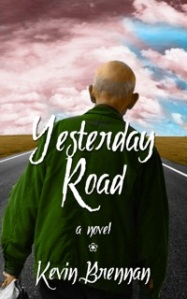 Welcome to Author Wednesday! One year of posts introducing authors and their work to the followers of this blog has been a most pleasant journey. Today I welcome Keven Brennan, the author of several works of literary fiction. In his latest work, Yesterday Road, a “coming-of-old-age” tale, Jack Peckham finds himself on a journey into his distant past, helped along the way by Joe Easterday, a young man with Down syndrome, and Ida Pevely, a middle-aged waitress with her own mountain of regrets. According to Kevin, “We all tow our histories behind us as we make our way down Yesterday Road.”
Welcome to Author Wednesday! One year of posts introducing authors and their work to the followers of this blog has been a most pleasant journey. Today I welcome Keven Brennan, the author of several works of literary fiction. In his latest work, Yesterday Road, a “coming-of-old-age” tale, Jack Peckham finds himself on a journey into his distant past, helped along the way by Joe Easterday, a young man with Down syndrome, and Ida Pevely, a middle-aged waitress with her own mountain of regrets. According to Kevin, “We all tow our histories behind us as we make our way down Yesterday Road.”
Welcome to Author Wednesday, Kevin. I’m so glad you dropped by today to tell us a bit about Yesterday Road. What’s your pitch for this book book?
Jack Peckham is trying to find his way home. Home’s a tough nut to crack.
If Jack is the protagonist, who or what is the antagonist in your book?
The real antagonist in this book is memory. I have two characters struggling with it: one, Jack Peckham, who has a form of dementia that is preventing him from remembering anything about his past life, and the other, Ida Pevely, who wishes she could escape some of her more troubling memories.
So, though memory isn’t a character per se, I enjoyed playing with its possibilities, such as the way it isn’t always reliable or accurate and how it is always embedded in us even if we can’t call something up on demand. Jack has his entire history in his mind, but his mind has built a wall around certain painful things.
That’s so very true. We store away the emotion, if not the actual memory. I believe that all memory is fiction; just sit in on any family reunion of people raised in the same household. What type of research did you do in the writing of this book?
I did quite a bit of research about Alzheimer’s disease and other kinds of memory loss, since that’s Jack’s main characteristic. I also have a character with Down syndrome, thirty-year-old Joe Easterday, so I did a lot of research on that, too. I wanted to make sure I was creating a realistic character, but one who could also carry some weight in scenes and dialogue.
Without giving us a spoiler, tell us a little bit about your favorite scene in this book.
I have quite a few favorite scenes, actually. There are a lot of funny, poignant moments. But I think the first one a reader will come across is a scene where Jack and Joe get abducted by a hapless carjacker named Steve, who’s trying to get out of the reach of his bookie. That scene kind of sets the tone for the middle of the novel.
That sounds great. I just downloaded to my Kindle, so I look forward to that scene and others that I’m sure are equally enticing. What is the best thing someone could say about this book?
The best I’ve heard so far from a number of readers is that they didn’t want the book to end. That’s a fantastic feeling.
I agree that hearing those words from a reading keeps me going. It’s always interesting to hear when other authors find their voice. Do you know when first discovered yours?
Though I was already writing fiction in high school, I don’t think I really landed on my own voice or approach until I dug in and began a novel in my late twenties. Until then, I was probably emulating my favorite writers too much, but attempting a novel showed me how I could use different techniques and tones to get the effects I wanted. I discovered the possibilities of multiple points of view, nonlinear narrative, and use of thematic motifs, and that’s when I understood I had to be a novelist.
That’s not unusual to emulate at first. But at some point, it’s time to put down what others have done and pick up our own voice. Rachel Carson, author of Silent Spring said she never chose a subject because as a writer, the subject chose her. Has this ever happened to you?
Quite a while ago now, I stumbled upon a small factoid in the newspaper that described something I would never have thought to write about (baseball in prisons). I couldn’t stop thinking about it, and over the years I’ve been working on a novel based on it.
That’s an interesting one. I think you’re supposed to write that book. Do you have similar messages or themes that you try to convey to your readers?
I keep gravitating to identity themes, for some reason, especially the idea that we are what other people see us as. I don’t happen to believe that as a philosophy of life, but it’s really ripe territory for fiction.
Does setting play a role in your books?
Sometimes it has a very large role, as in my first novel, Parts Unknown. There the setting of Sonoma dairy country has had a major influence on the characters, between the stark beauty of the place and the harsh working conditions for dairy farmers back in the ‘40s. The main character, Bill Argus, has also banished himself to the California desert, which suits his assessment of himself.
There the setting of Sonoma dairy country has had a major influence on the characters, between the stark beauty of the place and the harsh working conditions for dairy farmers back in the ‘40s. The main character, Bill Argus, has also banished himself to the California desert, which suits his assessment of himself.
Other times, the setting is more of a backdrop, as is San Francisco in my next book. It simply provides the right urban vibe for the action.
Both settings sound very powerful. All of your books are in the genre of literary fiction. Do you plan to continue writing in the same genre?
Well, I always write what I like to think of as literary fiction, but I also like to apply the techniques of literary fiction to other genres. My next book is essentially chick lit. I also have a dystopian novel, and I’m developing a thriller, a couple more comedic novels, and a historical novel. I don’t like to repeat myself!
Chick lit, huh? That’s quite a leap. Be sure to stop by when you’ve published that one. What’s the best thing said about one of your books by a reviewer?
People have said a lot of nice things about my latest book, Yesterday Road, but I always go back to a reviewer of Parts Unknown (from the Denver Post) who said I had proved that male authors can write female characters convincingly. It really bolstered my confidence and reassured me that it’s not a big risk to attempt that. Characters are people, after all. And they should also be unique, so that stereotypes and gender roles are often off the table.
That’s quite high praise. How about your preferences when writing? Do you listen to music while you write?
I do listen to music, and it can be anything from classical to jazz to indie to electronic. I tend to prefer instrumental music while I write though. Lyrics seem to distract.
I’m the same way. I love lyrics, and I tend to sing along and I can’t do that when I’m writing. What do you do during your down time?
I’m trying to get better at jazz guitar. I bought a very nice Gibson last year, and I feel I owe it some dedicated practicing.
Good luck with that. Thank you so much for stopping by Kevin. I look forward to reading Yesterday Road and your other books.
Readers: From April 1 through April 7, Yesterday Road will cost $1.99 instead of the regular $3.99.
 About Kevin Brennan: Kevin, author of Parts Unknown (William Morrow) has rung in the new year in Red Square, performed as a busker in the London Underground, wandered the California desert, and auditioned unsuccessfully for a chance at stardom on reality television. He and his wife live in Northern California.
About Kevin Brennan: Kevin, author of Parts Unknown (William Morrow) has rung in the new year in Red Square, performed as a busker in the London Underground, wandered the California desert, and auditioned unsuccessfully for a chance at stardom on reality television. He and his wife live in Northern California.
Links
Yesterday Road (October 2013, literary fiction/humor)
Amazon
Barnes & Noble
iTunes
Sony
Kobo
Smashwords
 Our Children Are Not Our Children (August 2013, flash fiction)
Our Children Are Not Our Children (August 2013, flash fiction)
Amazon
Barnes & Noble
iTunes
Kobo
Smashwords
Sony
Parts Unknown (January 2003, literary fiction, William Morrow/HarperCollins)
Direct from author (signed & inscribed)
10 responses to “Author Wednesday – Kevin Brennan”
This looks very interesting, I just downloaded it. Thanks for introducing us to this find!
LikeLike
It’s a powerful book. My review of it will be out on Friday.
LikeLike
well said………keep going……#wordpress!
LikeLike
Thank you.
LikeLike
Reblogged this on What The Hell and commented:
Many thanks to Patricia Zick for this interview opportunity at Writing Whims!
LikeLike
Excellent review! I believe you will enjoy Yesterday Road. I certainly did 🙂
LikeLike
Yes, my review will appear tomorrow. I enjoyed getting to know Kevin through this interview, which made the reading of his novel even more interesting.
LikeLike
Ha ha…love that he calls his next book Chick Lit! I’m lost in that genre because I feel that’s where my writing probably falls and I’ve learned we’re not supposed to call it that anymore. So what is it then?!
Great interview, PC.
LikeLike
Women’s literature, seriously.
LikeLike
LOL
LikeLike